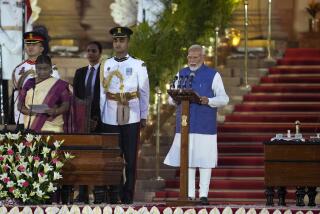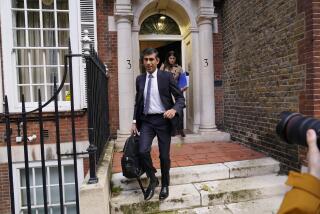Scientist Is Elected India’s President
- Share via
NEW DELHI — A missile scientist who advocates nuclear weapons as a war deterrent was elected India’s ceremonial president Thursday.
A.P.J. Abdul Kalam won 89.58% of the votes cast by 4,896 members of Parliament and state legislatures. The only other candidate was Lakshmi Sehgal, an 87-year-old woman proposed by leftist parties.
Although born to Muslim parents, Kalam, 71, does not describe himself as Muslim. He reads Hindu scriptures each day and is a vegetarian.
Critics of Prime Minister Atal Behari Vajpayee’s Hindu nationalist Bharatiya Janata Party, or Indian People’s Party, say Kalam was chosen to paper over the anti-Muslim image the government acquired after sectarian violence broke out in the western state of Gujarat in February.
Opposition parties and human rights groups have blamed the BJP-run state government in Gujarat of encouraging the religious violence--or doing little to stop it. About 1,000 people, most of them Muslims, were killed in the clashes.
Muslims have mostly reacted with indifference to Kalam’s elevation to the presidency. He is identified with the BJP to such an extent that no Muslim organization has welcomed his selection.
Kalam said his scientific career prepared him for politics. The father of India’s nuclear missile program, he helped develop missiles to carry nuclear weapons and rockets to launch satellites.
“Unless political decisions are taken, the satellite won’t be in orbit, the missile won’t reach its target, the nuclear weapon won’t be there,” Kalam said.
He will be sworn in as India’s 11th president next Thursday, replacing Kocheril Raman Narayanan, who is completing a five-year term in office.
Kalam, an advocate of scientific education for children, has insisted that his presidency would not signal warlike intentions from India.
Instead, it would show the world that “technology is going to be used for development of the nation,” he said.
Kalam told reporters Thursday that the alleviation of poverty and development of rural areas are important issues for India.
More to Read
Sign up for Essential California
The most important California stories and recommendations in your inbox every morning.
You may occasionally receive promotional content from the Los Angeles Times.













